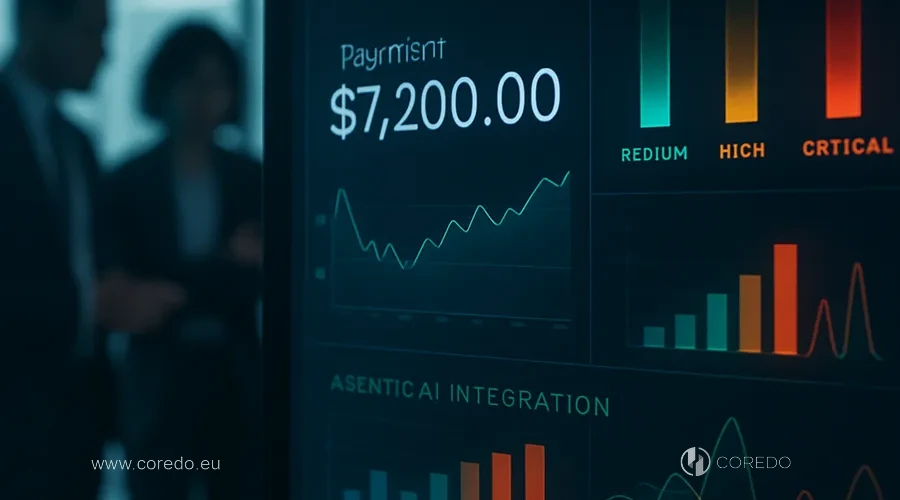Agentic AI in retail and SME banking is a new stage in the development of digital solutions, when artificial intelligence not only helps perform individual tasks, but also makes decisions and acts autonomously to achieve business goals.
Definition of Agentic AI and its key features
Differences between Agentic AI and machine learning with RPA
Technologies in the banking sector 2025 – Agentic AI
Transformation of retail and SME banking with Agentic AI

The transformation of retail and SME banking with Agentic AI begins a new era where autonomous AI agents not only optimize internal processes but fundamentally change the approach to servicing customers and small businesses. Thanks to the ability to make decisions independently and learn from every interaction, Agentic AI becomes the foundation for more personalized, proactive banking services that distinguish retail and SME solutions in a competitive environment.
Improving customer experience and personalization of services
Agentic AI radically changes the approach to customer interactions: now a bank can offer personalized financial products, respond instantly to requests and forecast the needs of SME clients. Through deep analysis of behavior and transactions, AI for small and medium businesses creates individualized offers, increasing loyalty and reducing customer churn.
Automation of KYC and AML procedures for security
The automation of KYC and AML is a key driver of Agentic AI adoption in banks across Europe and Asia. Modern platforms are capable of collecting, analyzing and verifying client data in real time, detecting suspicious operations and generating reports for regulators. Agentic AI for combating fraud uses predictive analytics and machine learning to identify complex money laundering schemes and prevent financial crimes.
Optimization of scoring and SME lending
Agentic AI transforms SME lending processes by automating credit scoring, analyzing non-trivial data sources (for example, behavioral and industry indicators), as well as dynamically reviewing limits and lending terms. As a result, banks can make decisions faster and more accurately, reducing default rates and expanding access to financing for small and medium-sized businesses.
Transaction monitoring and prevention of financial crimes
The use of autonomous AI for transaction monitoring provides round-the-clockreal-time monitoring of operations, instant detection of suspicious schemes and automatic escalation of incidents. Examples of using Agentic AI to prevent financial crime include the implementation of multi-layered filters, self-learning models and integration with global sanctions databases.
Agentic AI in banks: business effects and benefits

Agentic AI in banks is a new stage in the development of autonomous intelligent systems capable of making decisions and performing complex operations without constant human intervention. Today, such technologies offer banks unique business effects and benefits: from cost optimization to increased team productivity and the implementation of more accurate risk management models.
Improving efficiency and reducing costs
The impact of Agentic AI on banks’ operational efficiency manifests in the automation of routine processes, reduction of application processing times, lower compliance costs and a reduced human factor in critical operations. As COREDO’s practice shows, the implementation of autonomous AI agents allows banks to reallocate resources to the development of new services rather than manual data processing.
Scaling AI in finance and ROI of implementation
Scaling AI in the financial sector requires flexible architecture and competent change management. The ROI from implementing Agentic AI is calculated based on reductions in operating expenses, revenue growth from new services and improved customer satisfaction. In one of COREDO’s projects for a bank in Asia, the return on investment in Agentic AI was 220% in 18 months due to reduced AML costs and an increased number of SME clients.
Risk management and compliance with Agentic AI
Agentic AI integrates into banks’ compliance systems to automate monitoring, reporting and risk management. This allows not only compliance with international standards (for example, AMLD in the EU or MAS in Singapore), but also proactive identification of new threats. The solution developed by COREDO for a bank in the United Kingdom enabled a shift from reactive to proactive risk management, reducing the number of incidents by 35%.
Risks of integrating Agentic AI into retail and SME banking

The risks of integrating Agentic AI into retail and SME banking require special attention to how the new autonomous systems interact with existing technological and organizational processes. Despite significant potential to improve efficiency and reduce operating costs, the implementation of agentic AI often faces a number of challenges, especially when working with outdated IT infrastructure and complex internal bank processes.
Integration issues with legacy systems: technical and organizational
Integrating Agentic AI with banks’ legacy systems is one of the main technological challenges. Old platforms often do not support modern APIs, have limitations in processing large volumes of data and do not provide the required level of security. In COREDO’s practice for a bank in the Czech Republic, a phased migration was implemented: through middleware solutions and cloud services it was possible to ensure seamless operation of the new AI agents with the existing infrastructure.
Regulatory requirements and compliance in Europe and Asia
How to ensure Agentic AI meets regulators’ requirements in the EU and Asia? It is important to consider the specifics of national and international standards such as GDPR, AMLD, PSD2, MAS Guidelines. The COREDO team supports projects at all stages, including legal expertise, AI model audits and the preparation of documentation for regulators. This approach minimizes the risk of fines and accelerates the approval of new services.
Ethical and systemic risks of AI agents
Agentic AI brings not only technological but also ethical challenges: transparency of decision-making, prevention of discrimination, personal data protection. Systemic and algorithmic risks require the implementation of explainable AI mechanisms, regular model audits and access control to data. At COREDO we recommend integrating ethical principles and risk assessment procedures at early stages of Agentic AI deployment.
Agentic AI in international banks: best cases and practices

Agentic AI in international banks today sets a new standard for efficiency, autonomy and personalization of banking services, from improving customer service quality to automating key processes and minimizing risks. The best cases and practices demonstrate how the implementation of such solutions not only optimizes operational activities but also opens new opportunities for retail and SME banking.
Transformation of retail and SME banking with Agentic AI
Scaling and change management when implementing AI
Scaling AI solutions requires a clear change management strategy: staff training, phased integration, testing on pilot segments, and continuous performance monitoring. COREDO’s practice has shown that successful projects are built on close collaboration between IT, legal, and business teams, as well as on deploying flexible Agentic AI platforms capable of adapting to the requirements of different jurisdictions.
Practical tips for entrepreneurs and executives

Practical tips for entrepreneurs and executives are especially relevant in the context of modern banking technologies. Today Agentic AI opens new opportunities for automation, risk reduction, and improving customer experience, making businesses more competitive. Below are the key steps to prepare a business for successful work with banks in the era of Agentic AI.
How to prepare a business for banks with Agentic AI?
AI for small and medium-sized businesses opens new opportunities for quick access to financing, personalized products, and automated services. I recommend preparing corporate processes for digital transformation in advance: ensure transparency of the corporate structure, prepare high-quality KYC/AML documentation, and implement internal data governance procedures.
How to choose a banking partner with Agentic AI
Banking technologies in 2025 require partners to be not only innovative but also compliant with regulatory and ethical standards. When choosing a bank, pay attention to the maturity of Agentic AI platforms, experience in your industry, and the presence of transparent compliance procedures. The COREDO team recommends conducting independent audits of AI platforms and assessing their integration with your business processes.
AML in AI-banking: how to minimize risks
Automating KYC and AML is key to reducing risks and accelerating operations. It is important to regularly update internal policies, train staff, and use solutions certified to international standards. COREDO’s practice shows that integrating Agentic AI with systems for combating financial crime not only helps meet regulator requirements but also protects the business from new threats.
Key takeaways and steps for action
Agentic AI is becoming a strategic tool for transforming retail and SME banking, providing new levels of efficiency, security, and personalization. Nevertheless, implementation success depends on proper integration with legacy systems, adherence to regulatory and ethical standards, and the business’s readiness for change.
I recommend:
- Building Agentic AI implementation on a clear change management strategy and phased integration.
- Choosing partners with proven AI expertise and experience operating in your jurisdiction.
- Implementing metrics to assess effectiveness (cost reduction, revenue growth, risk reduction, ROI from Agentic AI implementation).
- Continuously improving AML/KYC procedures and auditing AI models for transparency and compliance with standards.
COREDO’s experience confirms: only a comprehensive and strategic approach to implementing Agentic AI enables not only meeting market requirements but also outperforming competitors, creating a resilient and innovative business amid digital transformation.